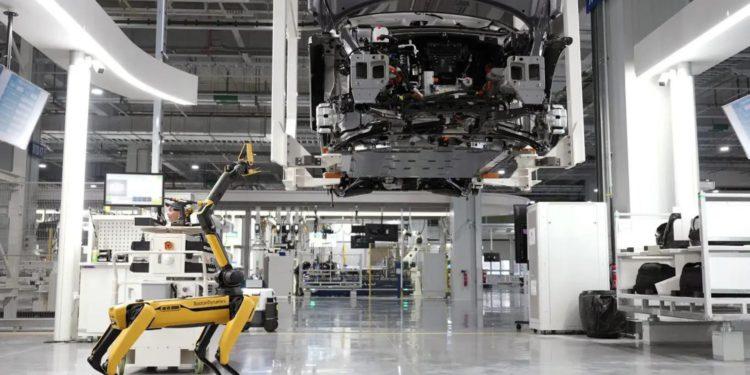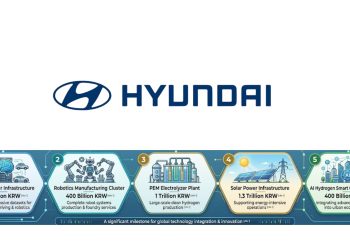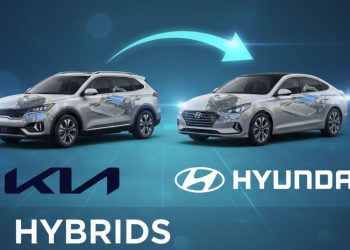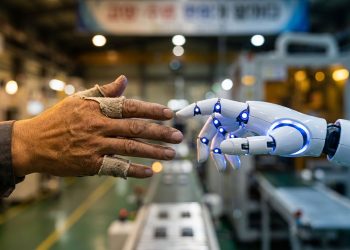Hyundai has inaugurated its Innovation Center Singapore (HMGICS), for further expansion within the electric vehicle (EV) sector. Described as a “smart urban mobility hub,” the facility relies on robotic systems, including robot dogs and artificial intelligence, to automate the process of purchasing personalized Hyundai EVs.
The officially launched Innovation Center Singapore is a highly automated facility designed to play a key role in the brand’s long-term electrification strategy. This seven-floor, 935,380-square-foot center is operational after three years of construction and initial operations.
With 200 robots handling more than 60% of repetitive tasks, human workers can now redirect their efforts toward more creative and productive responsibilities.
After surpassing Ford and GM in US electric vehicle (EV) sales during the third quarter, Hyundai, including its subsidiary Kia, is keen on sustaining its momentum. South Korea’s leading automaker envisions this new facility, part of the Hyundai Motor Group Innovation Center in Singapore, as a center point in driving the company’s progress in the electrification era for the next five decades.
Capable of manufacturing up to 30,000 electric vehicles annually, the facility has already been engaged in the production of Ioniq 5 cars and fully autonomous robontaxis, with plans to incorporate the Ioniq 6 into its manufacturing lineup by 2024.
According to Alpesh Patel, VP and Head of the factory’s Technology Innovation Group, HMGIC envisions a “human-centric manufacturing innovation system” facilitated by integrating robotics, AI, and IoT technologies.
The seven-story, 68,900-square-meter facility, operational since early this year, has a vehicle test track exceeding 2000 feet and a robotically assisted “Smart Farm” capable of cultivating up to nine different crops. This convergence of automotive production and agricultural innovation lines up with the Singapore government’s “30 by 30” initiative.
The technology hub redefines the traditional automotive manufacturing process and offers an immersive experience for customers. Set as one of Hyundai’s two innovation pillars for the electrification era, the facility introduces unprecedented ways for electric vehicle (EV) buyers to engage with their vehicles and the Hyundai brand.
With a focus on flexibility and personalization, the HMGIC provides features such as flexible vehicle customization, virtual reality (VR) factory tours, test rides, and even a “smart farm” experience.
Hyundai, including its subsidiary Kia, has captured 7.5% of the share in the EV market with a collective sale of 64,000 EVs. Automotive News registration data reveals this market dominance, positioning Hyundai as a formidable player, trailing only behind Tesla with a 57.4% share.
The impressive growth occurred despite Hyundai’s EVs not qualifying for the $7,500 EV tax credit, a benefit accessible solely through leasing. Hyundai’s plans to partner with Amazon further supported its EV sales strategy, enabling the sale of its electric vehicles on the e-commerce platform for the initial year.
Hyundai’s global president, Jose Munoz, expressed the future of EVs, asserting, “I am still very bullish” ahead of the LA Auto Show. He emphasized the demand for more production capacity, stating that Hyundai could sell more electric cars with increased capacity.
The construction of Hyundai’s first US EV plant in Georgia, with a substantial investment of $5.5 billion, is nearing completion. Once operational, the mega plant is poised to make Hyundai EVs eligible for the EV tax credit, further strengthening the brand’s position in the growing electric vehicle market.
Also Read:
- Hyundai Unleashes High-Performance Electric Power with IONIQ 5 N
- LG and Hyundai Collaborate In-Car Entertainment with WebOS for Automotive
- Safeware, a leader in human safety solutions, now equips Hyundai E&C with its advanced wearable smart anti-falling airbag, C3
- KT, Hyundai E&C, and STC Forge 50-Year Digital Infrastructure Partnership in Saudi Arabia
- Hyundai and Kia Forge Partnership with Infineon to Secure Power Semiconductor Supply







